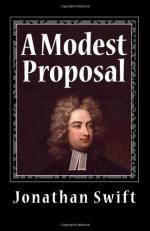|
This section contains 2,484 words (approx. 9 pages at 300 words per page) |

|
SOURCE: Donoghue, Denis. “Words.” In Jonathan Swift, a Critical Introduction, pp. 117-159. Cambridge: Cambridge University Press, 1969.
In the following excerpt, Donoghue remarks on the exuberant rhetoric of A Modest Proposal.
Many features of [A Modest Proposal] are at once obvious and important; the tone of the projector fending off human and moral considerations in his economic zeal and yet, now and again, stumbling upon a cliché which conceals an ironic truth—as when the projector varies his diction and calls the people of Ireland ‘souls’; or the tour de force of out-Heroding Herod by parodying the Massacre of the Innocents. The basic technique is what Kenneth Burke calls ‘planned incongruity’, the imposition of a proper perspective by putting gross perspectives in lurid proximity. Much of Swift's irony is enforced by these discrepancies; the merit of incongruity is that a writer may capitalise upon it. In the face of...
|
This section contains 2,484 words (approx. 9 pages at 300 words per page) |

|


